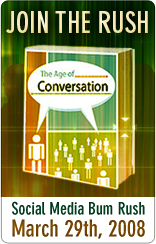Join the Rush! Buy The Age of Conversation, Give Sick Kids the Gift of Life
March 29th 2008 08:23
Age of Conversation: 100+ Authors Write to Raise Funds for Children's Charity
Today's the day to join the concerted effort of a dedicated group of people from all over the blogosphere (and all over the world) to drive last year's Age of Conversation collaborative book project to the top of the Amazon charts! Why? To raise awareness for the soon-to-be-published Age of Conversation 2008 sequel*--and simultaneously raise even more funds for Variety Children's Charity. (All monies raised through the books' sales and referrals go to Variety's Lifeline Children's Project.)
Two Bloggers Take On a Monumental Task
Spearheaded, organized, overseen, and edited by bloggers Drew McLellan and Gavin Heaton, the original Age of Conversation “brings together over 100 of the world’s leading marketers, writers, thinkers and creative innovators in a ground-breaking and unusual publication.” If you're interested in good writing, great wisdom on business and life, and helping sick children get well, please join this effort to bring the book the attention it deserves. As mentioned above, no one involved in this project will be making a profit from the book's production and sale: 100% of the proceeds will go to Variety Children's Charity (just as they will with the book's sequel).
Variety Children's Lifeline Program
Here's what Drew had to say about this charity in his Age of Conversation's Gift of Life post last year:
Lifeline's sole mission is providing medical assistance to children with treatable and survivable heart conditions in countries where the appropriate medical facilities, expertise or resources do not exist.
Today's Effort to Launch The Age of Conversation to the Top of the Charts Explained
Today's launch of the Age of Conversation Bum Rush is explained at Chris Wilson's Marketing Fresh Peel blog, in the following two posts: The Launch: The Age of Conversation Bum Rush and The Real Age of Conversation Bum Rush: March 29th. Please drop by and check out these posts. And if you feel this to be a worthy endeavor, consider joining these hard-working authors in helping to make a difference in the lives of sick children around the world by buying your copy of The Age of Conversation and encouraging others you know to do the same.
Please use the following link (or one of the specially designated links at other participating blogs) when purchasing The Age of Conversation. This will ensure that referral monies go to Variety Children's Charity, in addition to book sale proceeds.
Each purchase will only be counted once, regardless of how many books you purchase; so please buy each book separately (Super Saver shipping to the U.S. is free on this item)--and buy it TODAY--to help this charitable project gain greater recognition by rising to the top of the Amazon Best Seller List.
Hope you'll join us!
Jeanne
* While I wasn't among the authors of the original Age of Conversation, I will be on board for The Age of Conversation 2008--along with 274 other dedicated writers and bloggers. (What a wonderful way to use our writing talents--by helping others! I highly recommend it!)
INTERIM PROGRESS REPORT - 6 AM CST, MARCH 29TH: Between 2 pm CST, March 28th and 1:30 am CST, March 29th, the book's ranking rose from #102,282 to #16,879! Way to go, everyone! Further updates will be posted at Marketing Fresh Peel, in Chris's Launch post, and also on Twitter, throughout the day (info in the Launch post).
3:15 pm CST: AOC has jumped to #368! Keep up the good work, everyone!
AOC made it to #262 of all books sold at Amazon.com on March 29th. Not as high as we'd hoped, but not bad, at all! (At one point, it actually hit #33 in the Business/Investing category.) Great work, everyone!
Did you enjoy this post? Have anything to add? Which worthy causes have you loaned your writing talents to, and did you feel as if you'd made a difference?
Please note: If the StumbleUpon and other social bookmarking buttons aren't visible, please click the "Add Comments" link beneath this post. Thanks!
| 81 |
| Vote |








 Add Comments
Add Comments Comments (48)
Comments (48)